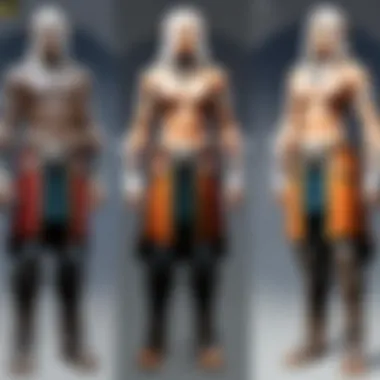Exploring the Intricate Roles of NPC Jobs in WoW


Intro
In the intricate world of World of Warcraft, non-playable characters (NPCs) serve as the backbone of the gameplay environment. They are more than mere background figures; they enrich the universe, provide context, and enhance the player experience. The roles these NPCs play are diverse, ranging from quest givers to vendors, and their contributions are vital for both the narrative and gameplay mechanics.
Understanding NPC jobs is critical for players who wish to delve deeper into the game’s lore and expand their strategic approach. This article examines the nuances of NPC roles, detailing how each category operates within the vast World of Warcraft ecosystem. By evaluating their functions, players can appreciate the layers of storytelling and gameplay that these characters bring.
Throughout this article, we will explore various aspects including NPC employment specifics, their significance in quests, and the overall impact they have on the lore. This comprehensive guide aims to deepen your understanding of NPC jobs, highlighting how these characters contribute to the enchanting world of Azeroth.
Preface to NPCs in World of Warcraft
Non-playable characters (NPCs) are an essential part of the World of Warcraft experience. They contribute significantly to gameplay, narratives, and player interactions. Understanding NPCs helps players appreciate the game's depth. NPCs serve various functions, from providing quests to selling items. They enhance the world, making it feel populated and alive.
Definition of NPCs
In the context of World of Warcraft, NPCs are characters that players cannot control. They exist primarily to enrich the game environment. Unlike player characters, NPCs have predetermined behaviors and roles. Their actions are scripted, yet they offer meaningful interactions. Examples include quest givers, trainers, and vendors.
Types of NPCs in the Game
World of Warcraft features several types of NPCs, each serving a unique function. This classification is crucial for understanding how players engage with the game. Here are the main categories:
Friendly NPCs
Friendly NPCs are allies within the game. They assist players in various ways, like offering quests, selling goods, or providing services. Their most significant role is as quest givers. Without friendly NPCs, players would struggle to find direction. This category is vital for game progression. The unique feature of friendly NPCs is their ability to facilitate storylines and connect players to the lore. They act as anchors in the expansive world of Azeroth, creating a sense of community and support that is often beneficial for new players.
Hostile NPCs
Hostile NPCs, on the other hand, are adversaries. They challenge players in battles and quests. Their primary role is to create conflict and tension in the game. By defeating hostile NPCs, players earn rewards and progress. A key characteristic of hostile NPCs is their ability to enhance the gaming experience through challenges. They push players to strategize and develop skills. However, a potential downside is that some may find grinding against them tedious.
Neutral NPCs
Neutral NPCs sit between the friendly and hostile spectrum. They do not engage directly with players, nor do they pose threats. Instead, they often provide background information or serve as context in the game's richer lore. They add depth to the game world, allowing players to immerse themselves in its narrative. This neutrality offers a different kind of engagement, making players more aware of the environment and its history. Their presence can be beneficial, as they help populate the world without imposing on player progression.
Categories of NPC Jobs
The concept of NPC jobs in World of Warcraft is pivotal for the overall game experience. Different categories of NPCs serve distinct functions, each contributing to the intricate tapestry of gameplay. Understanding these roles helps players navigate the world more effectively and enriches their engagement with the game. NPCs are not mere background characters; they are the active facilitators of the adventures players undertake. Their jobs provide structure and objectives, enhancing the immersive experience that the game is known for.
Quest Givers
Quest Givers are among the most essential NPCs in World of Warcraft. They provide players with actionable objectives that drive the narrative forward. Through quests, players learn new lore, build their characters, and explore different gameplay mechanics.
These NPCs typically reside in towns or other safe areas. They have a distinct look, often denoted by an exclamation mark above their heads. This visual cue signals to players that these characters offer quests.
Quest Givers can vary widely in personality, from sage-like figures to quirky merchants. The diversity in their dialogue and quests adds flavor to the overall game experience. Furthermore, many quests are tied to the game’s overarching story, giving players a sense of progression and purpose.
Vendors
Vendors serve a practical role within the game, acting as the primary source for goods and items. They sell weapons, armor, consumables, and sometimes unique items. The availability of these products directly impacts a player’s ability to succeed in their journey.
Each vendor has specific items they offer, making some more relevant to particular character classes or factions. This specialization encourages players to explore different areas of the game to find the best gear or supplies. Furthermore, vendors offer a way to trade in unwanted items for valuable resources, enhancing the economy within the game.
Trainers


Trainers play a crucial part in character development. They teach players new skills and abilities, enabling them to progress and adapt to increasingly challenging scenarios. Different trainers specialize in various skills, such as weapon mastery or crafting.
Finding the right trainer can be essential when developing a player's build. Knowing the locations and specialties of trainers can give players an edge, allowing them to maximize their efficiency and effectiveness in combat. Especially as gameplay evolves, understanding training opportunities ensures that a character remains competitive.
Storytelling and Lore NPCs
Some NPCs are created primarily for storytelling and lore purposes. These characters often have rich backstories and are woven into the broader narrative arc of the game. They provide context and depth, helping players understand the stakes and histories that shape their adventures.
Interactions with these NPCs often lead to revelations about the game's world. Players might encounter them in significant places or during pivotal quests, enriching their overall understanding of the universe. These NPCs enable players to feel more connected to the lore and narratives that define World of Warcraft.
World Event NPCs
World Event NPCs are unique in that they often only appear during specific time-limited events or seasonal changes. These characters may provide special quests, unique rewards, or contribute to a larger, temporary narrative. Engaging with them can yield rare items or achievements, making their value significant during events.
Players may find World Event NPCs in different locations, encouraging exploration and participation in community events. They help to create a dynamic environment, making the game feel alive and continually evolving.
In summary, understanding the various categories of NPC jobs in World of Warcraft provides valuable insight into the game’s mechanics and narratives. Players should appreciate the distinct roles these characters play, as they significantly enhance the gameplay experience.
The Role of NPC Jobs in Gameplay
NPC jobs serve as the backbone of gameplay in World of Warcraft. They create structure and a sense of purpose within the vast game world. As players progress, they rely heavily on these characters to guide their journey, providing essential resources and plot development. Understanding the roles that NPCs play helps players appreciate their interactions, making the experience richer and more immersive.
Facilitating Progression
The first prominent function of NPCs is facilitating player progression. From the moment a player enters the game, they encounter quest givers who play a vital role in guiding the player through the content. These NPCs lay out objectives, offer rewards, and encourage exploration. As players complete quests, they earn experience points and unlock new skills, which are crucial for improving their characters.
Furthermore, NPC trainers are essential for character growth, allowing players to acquire new abilities or improve existing ones. For example, a Mage may visit a trainer to learn a new spell, directly impacting their effectiveness in combat. This is not just about leveling but also about enhancing a player's understanding of game mechanics.
In addition, vendors provide necessary gear, consumables, and other resources vital for a player’s success in battles and quests. The availability of items from vendors eases the burden of gathering resources, allowing players to focus on experience rather than tedious resource management.
Enhancing Player Experience
NPCs significantly enhance player experience by introducing variety and depth to interactions. Each NPC carries a unique personality, often reflected in dialogue and quests. This diversity in character design keeps the game interesting and encourages players to explore different areas and storylines.
Moreover, NPC-driven events can create a dynamic world where players feel their actions have consequences. For example, participating in a world event initiated by an NPC may change the game environment temporarily, fostering a sense of community and engagement among players. These interactions encourage collaboration, especially in a game as vast and socially driven as World of Warcraft.
NPC jobs are not merely functional; they are essential to creating an engaging narrative and a fulfilling player journey.
In summary, NPC jobs go beyond simple tasks. They are integral in facilitating player progression and enhancing the overall gaming experience. Without these characters, the rich tapestry of World of Warcraft would unravel, leaving players with a less immersive and rewarding experience.
NPC Jobs in Quests
In World of Warcraft, non-playable characters (NPCs) serve vital roles in quest design. NPC jobs in quests are not merely functional; they create immersive experiences for players, all while driving the narrative of the game. These characters are essential in framing quests, providing motivations, and facilitating interactions that enrich the overall gameplay.
Importance of Quests
Quests in World of Warcraft are a primary means through which players engage with the game world. They offer structure and direction. NPCs often act as quest givers, linking the player to the game's lore and narrative arcs. The importance of quests extends beyond mere goals. They allow players to explore the environment, uncover stories, and discover hidden lore elements. NPCs make these storytelling possibilities tangible.
Moreover, quests serve to introduce new mechanics and area-specific challenges. As players advance, well-designed quests calibrated with NPC guidance can enhance player skills and understanding of the game. Quests can also promote cooperative gameplay, where players may join forces to tackle objectives presented through NPC dialogues. This inclusivity fosters a community feel, nudging players toward collaboration.
Interactivity with NPCs


Interaction with NPCs during quests plays a critical role in shaping player experiences. Unlike static environment mechanics, NPCs respond to player choices. This interactivity can range from simple dialogue exchanges to significant branching narratives, depending on player actions.
Engaging with NPCs can yield significant rewards. For example, choosing a specific dialogue option may influence quest outcomes, allow for different quest paths, or unlock additional missions. This dynamic interaction model ensures that each player can tailor their gameplay experience and outcomes, thus promoting replayability.
"NPCs in quests help forge connections between the player and the world, providing depth and complexity."
Notably, the impact of NPCs goes beyond quests. Their roles in shaping the overall lore and game narrative constantly remind players of the significance of their journey. NPCs are not just conduits for quests; they are integral to creating a vibrant, living world where the player feels part of something greater.
Impact of NPC Jobs on Game Lore
NPC jobs play a pivotal role in shaping the lore of World of Warcraft. They are not mere background characters but integral actors that help to build a rich narrative tapestry. Their responsibilities, interactions, and contextual placements provide players with insights into the history, culture, and conflicts of the game world. This section will delve into the specific elements that underscore the importance of NPC jobs in enriching game lore, along with their benefits to players and overall considerations.
Narrative Contributions
NPCs contribute to the narrative in various ways. Quest givers frequently provide context for the tasks players undertake. The information they share connects players to the broader stories of factions, heroes, and challenges in the game. Each dialogue, lore item, or event connected to an NPC enriches the player’s understanding of the world.
For example, an NPC from the city of Stormwind might discuss the ongoing conflicts with orc clans in a quest dialogue. This not only details the nature of the conflict but also frames the historical enmity between the Alliance and Horde. Since World of Warcraft thrives on storytelling, these narrative contributions deepen player immersion. They transform a simple gaming experience into an ongoing saga that players feel a part of.
In addition, NPCs often mirror the reactions and opinions of the populace regarding major events. This helps to create a sense of community and shared experience within the game. Players can learn about the repercussions of past expansions or in-game events through the experiences of these characters.
"NPCs are the voices of the world; they give life to the history players interact with in real-time."
Cultural Significance
The cultural significance of NPC jobs in World of Warcraft extends beyond individual narratives. NPCs embody the diverse cultures within the game. Each race’s NPCs reflect its values, beliefs, and social structures. For instance, the dwarven NPCs in Ironforge may emphasize craftsmanship and camaraderie, while night elves in Darnassus might focus on nature and harmony with the land.
These representations provide players with a broader understanding of the lore and differences among races. They help establish the game’s unique cultural identity, which resonates throughout its quests and interactions. This is vital, as players often view themselves as part of a larger community, not just solo adventurers.
Furthermore, NPCs often engage in cultural events. Seasonal events, festivals, and significant lore discoveries often include specific NPC roles that highlight and celebrate cultural aspects. This serves as a mechanism to foster player engagement with the lore, enhancing not just individual experiences but also the community’s shared knowledge.
The Evolution of NPC Jobs Over Time
The evolution of NPC jobs within World of Warcraft is a critical topic in understanding the game's growth and development. Since its launch in 2004, NPCs have transformed significantly, reflecting changes in gameplay dynamics and player expectations. Their roles have expanded beyond simple interactions, adapting to new technologies and player behaviors. These transformations provide insight into how player engagement can enhance the overall experience.
Changes in Gameplay Styles
The gameplay styles in World of Warcraft have changed considerably over the years. Initially, players engaged with NPCs primarily for quests or basic exchanges. As the game expanded, so did the complexity of NPC interactions. For instance, the introduction of dynamic events brought NPCs into the forefront of gameplay. Players began to see NPCs as not just quest givers but also as characters who could influence the game's world in real-time.
In recent expansions, Blizzard has added even more interactive elements to NPC jobs. Daily quests, faction reputations, and time-sensitive events have made NPC engagements more essential. This change reflects a broader trend in gaming where NPCs contribute to creating immersive and responsive environments. With these developments, players now rely heavily on the NPCs not only for guidance but also for the advancement of their own narratives in the game.
Technological Advances
Technological progress has played a significant role in the transformation of NPC jobs. Over the years, the game engine and artificial intelligence capabilities have seen substantial upgrades. Such improvements have allowed for more sophisticated behavior from NPCs. AI programming now enables NPCs to respond dynamically to player actions, creating a more lifelike experience.
The development of voice acting for NPCs added depth to character interactions, enhancing immersion. Players can now enjoy a richer narrative experience, making their quests feel more significant. Furthermore, the graphical updates have changed the presentation of NPC jobs, with detailed animations and models that contribute to the overall aesthetic of the game.
Understanding NPC Behavior Patterns
NPCs are integral to the World of Warcraft experience. Understanding their behavior patterns can enhance player interactions and provide insights into game mechanics. These patterns are refined through both artificial intelligence (AI) and decision-making frameworks that inform how NPCs act within the game's world. Recognizing these elements helps players appreciate the complexities of NPC roles.
AI and Decision Making


The AI governing NPC behavior in World of Warcraft is crucial for creating a responsive and immersive environment. Each NPC operates with predefined algorithms that dictate their actions based on player interactions, environmental factors, and game objectives.
For instance, quest-giving NPCs assess a player's progress and adjust their dialogue and responses accordingly. An NPC will change its dialogue if a player completes certain quests, reflecting a dynamic relationship built on player choices. NPCs use various decision-making processes, including:
- State-based actions: NPCs react to player actions contingent on their current state. For example, a peaceful trader may turn hostile if attacked.
- Probability-driven outcomes: Some NPCs make decisions based on chance, adding unpredictability to encounters. This keeps gameplay engaging, as players cannot always predict NPC reactions.
- Contextual awareness: NPCs consider the player's previous interactions. Friendly behavior may change to aggression if a player attempts to steal from a vendor.
The amalgamation of these decision-making processes leads to intricate interactions that elevate the gameplay experience.
Interaction Models
Interaction models define how players and NPCs communicate. These models vary widely, affecting the depth and quality of player experiences. Here are some of the key interaction model types present in World of Warcraft:
- Static Dialogue Trees: These provide players with a set of predefined responses. When engaging with a quest-giver, players select options that steer the conversation within fixed boundaries. While this offers clarity, it can limit nuance.
- Dynamic Responses: In contrast, NPCs can change their dialogue based on the situation. If a player has high reputation with a faction, an NPC may provide additional information or quests previously unavailable.
- Event-driven Interactions: These occur due to specific triggers, such as completing a series of tasks. The NPCs may alter their behavior and provide new dialogue options or items, reflecting the player's actions.
- Social Dynamics: NPCs engaging in group activities, such as vendors negotiating prices or trainers adjusting their training sessions, drive a social interaction model. This enriches the world by presenting NPCs as living, responsive characters rather than static figures.
In summary, understanding NPC behavior patterns enhances gameplay. It offers players strategies for interacting with the game world. With AI and decision-making frameworks laying the groundwork, the focus shifts to how players navigate these interactions. This knowledge is invaluable for maximizing engagement and exploration in the expansive universe of World of Warcraft.
Importance of NPC Jobs in the Community
The significance of non-playable character (NPC) jobs extends well beyond their individual roles. NPCs serve as foundational elements to the community in World of Warcraft. They enable social interaction and create shared experiences amongst players, fostering a sense of belonging. This article dives into two key aspects of NPCs' importance within the community: building player communities and facilitating group content.
Building Player Communities
NPCs act as facilitators of interaction among players. Quest givers, vendors, and trainers contribute to a player’s journey and inadvertently encourage players to engage with one another. Players often share tips about NPC locations or strategies to complete quests. Additionally, faction-related NPCs can drive players to form groups aligned with their interests. For example, when players join forces to defeat particularly challenging NPC enemies, they strengthen their social bonds.
Benefits of building player communities through NPCs include:
- Enhanced communication: Players often engage with others when NPC jobs prompt them to collaborate.
- Stronger alliances: Players find common ground in quests associated with specific NPCs, which can lead to long-term friendships.
- Shared knowledge: The need for cooperation pushes players to exchange information, promoting an environment rich in collaboration.
Ultimately, NPCs are vital as they provide common points for players to converge, share their experiences, and support one another in their adventures.
Facilitating Group Content
Another critical aspect of NPC jobs is how they facilitate group content. Events and quests designed for multiple players often revolve around NPCs. This enables the formation of groups that tackle challenges together. In many cases, NPCs will issue quests that require coordinated efforts. These quests not only bring players together but also introduce mechanics that necessitate teamwork.
Key elements of how NPC jobs facilitate group content include:
- Encouraging collaboration: Group quests often require diverse roles, urging players to strategize together.
- Creating competition: World events involving NPCs often draw numerous players, enhancing a sense of competition and excitement.
- Reward systems: NPCs frequently offer rewards, prompting players to join forces to maximize their achievements.
Ending
In exploring the roles of NPC jobs, this article highlights their pivotal function in enriching the World of Warcraft universe. NPCs are not merely background characters; they are integral to the game’s structure and narrative. Their presence facilitates various gameplay elements including questing, trading, and interaction that enhance player immersion.
Summary of Findings
Throughout this article, we analyzed several key aspects of NPC jobs, including:
- Diverse Roles: NPCs serve as quest givers, vendors, trainers, and storytellers. Each role contributes to deepening the experience within the game.
- Gameplay Integration: NPCs facilitate progression in games, making them essential in completing tasks and acquiring necessary items. This function fosters an engaging environment for players.
- Cultural Narrative: NPCs enrich the lore and world-building aspects of the game. They often embody cultural narratives that add depth to player experiences.
These findings underline how essential NPC jobs are in crafting not just gameplay mechanics, but a vibrant and immersive world.
Future Directions for NPCs in Gaming
As technology advances, the evolution of NPCs is anticipated to continue. Future developments may include:
- Enhanced AI Capabilities: More sophisticated artificial intelligence may enable NPCs to exhibit realistic behaviors. This will make interactions feel more lifelike and engaging.
- Dynamic Storytelling: Future NPCs could adapt storylines based on player choices, creating a unique narrative experience for each individual.
- Expanded Roles in Multiplayer: With the rise of cooperative and competitive gameplay, NPCs might take on new roles to facilitate group dynamics and enhance collaborative efforts among players.
These potential advancements suggest that NPCs will remain at the forefront of gaming development, contributing significantly to player engagement and narrative depth in the future.







